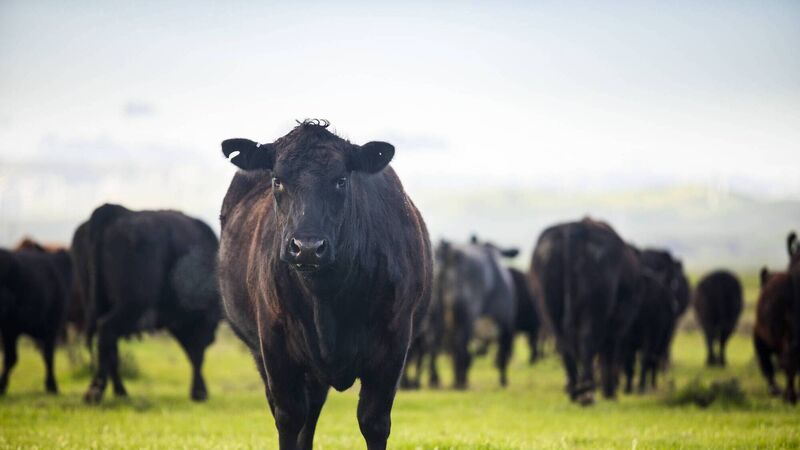Catherine Conlon: So, what really is the beef with... beef

Irish dietary guidelines recommend lean red meat as an excellent source of protein, a rich source of easily absorbed haem iron, and that it should be eaten two to three days per week. One serving is about 50- 75g, or about half the size of the palm of your hand.
A 2019 study led to some confusion about the potential health impact of consuming red meat.
As part of the study, published in Annals Of Internal Medicine, researchers undertook an extensive review of the evidence that looked at the effects of both red meat and processed meat on multiple health conditions, including heart disease, cancer, diabetes, and premature death.
Their findings suggested that eating red meat wouldn’t necessarily harm your health.
However, this statement was followed by a swift backlash from the science community
So, what is the beef about red meat? Is it good for you, or does it carry health risks?
Health effects of processed or unprocessed red meat
The researchers found ‘low’ evidence that either red meat or processed meat was harmful and advised that there was no need to reduce your regular red meat and processed meat intake for health reasons.
Harvard’s T.H. Chan School of Public Health was robust in its response to the study, stating that the new advice could potentially harm people’s health.
“This new red meat and processed meat recommendation was based on flawed methodology and a misinterpretation of nutritional evidence,” stated Dr Frank Hu, chair of the Department of Nutrition in response to the research. “The authors used a method often applied to randomised clinical trials for drugs and new devices, which is typically not feasible in nutritional studies.”
The study raised the question of whether red and processed meat are good for health or not, and whether people should cut them out altogether or cut back.
Dr Hu suggested that the accumulated body of evidence shows a clear link between high intake of red and processed meats and a higher risk of heart disease, cancer, diabetes, and premature death, with consistent evidence across multiple studies.
“The evidence shows that people with a relatively low intake have lower health risks,” Dr Hu said at the time. “A general recommendation is that people should stick to no more than two to three servings per week.”
However, in terms of processed meat, Dr Hu stated there is a much stronger association with a higher risk of heart disease and cancer – especially colon cancer. Much of this link may be due to the high amount of additives and chemicals, which may contribute to the health risks. This is why it is recommended to keep processed meat consumption to a minimum.
Research on health effects of unprocessed red meat
While there is evidence linking high intake of red and processed meats to a higher risk of heart disease, cancer, diabetes and premature death, what are the health effects of only eating unprocessed meat?
A review of the evidence in 2022, published in Nature Medicine found weak evidence of an association between unprocessed red meat consumption and colorectal cancer, breast cancer, type 2 diabetes, and ischaemic heart disease. The study found no evidence of a link between unprocessed red meat and stroke.
The study did suggest that more research was needed to better understand and quantify the link between unprocessed meat and the risk of chronic disease.
Benefits of meat consumption
Red meat has high amounts of protein, which helps promote muscle growth, and Vitamin B12 to help in the formation of red blood cells.
A 3 oz serving of red meat has almost half (45%) of the daily requirements for protein and about a third of the daily requirements for B12.
Meat is also rich in iron. Dietary iron is found in two forms: haem and non-haem iron. The haem content of red meat is ten times greater compared to white meat such as chicken. Haem iron is better absorbed than the non-haem iron typically found in plants. It is protective against anaemia as well as cognitive development in children and young adults.
It is also a good source of zinc that plays a vital role in the immune system, wound healing and cell growth, as well as selenium, which is a powerful antioxidant.
Beef and climate change
In recent years, discussion about red meat consumption has been as much about the impact of meat consumption on greenhouse gas emissions and biodiversity as it has been about health benefits or health harms of meat consumption. While animal foods are nutritious, they have been criticised as an inefficient use of resources. Beef production leads to the destruction of forests for new pasture and rising beef consumption requires increasing quantities of land.
As cows digest grasses and other plants, the process of digestion or enteric fermentation causes cows to burp, leading to the release of methane, a potent greenhouse gas, into the atmosphere. Methane is also released from manure.
Another powerful greenhouse gas, nitrous oxide is released from ruminant waste on pastures and from chemical fertilisers used on crops produced for cattle feed.
In 2020, the UN Food and Agriculture Organisation estimated that meat and dairy specifically account for 14.5% of global greenhouse gas emissions. If the world is to meet its target of limiting global warming to well below 2C, scientists say some degree of diet shift will be necessary.
In comparison to meat and dairy, plant-based foods have much smaller carbon footprints. On average, emissions from plant-based foods are significantly smaller than those from animal products, according to a study published in Science in 2018.
So where does all this leave us?
Most European dietary guidelines recommend limiting the amount of red and processed meat in the diet and to alternate between different protein sources, including fish, poultry/ lean meat removed of any visible fat, eggs, and plant proteins such as legumes, pulses or tofu.
Irish dietary guidelines recommend lean red meat as an excellent source of protein, a rich source of easily absorbed haem iron, and that it should be eaten two to three days per week. One serving is about 50- 75g, or about half the size of the palm of your hand.
In the case of processed meat, most countries encourage eating little if any. Irish dietary guidelines warn that these foods are high in salt, preservatives, and fat and include cured meats such as ham, sausages, luncheon meats, and salami.
A serving of meat half the size of the palm of your hand, while limiting processed meats to the bare minimum, would maximise health benefits and minimise the impact of red meat on the growing emergency of both climate and environmental impacts.
For some, the bottom line on consumption of red meat is hard to swallow.
However, the evidence clearly shows that the health benefits and environmental impacts of red meat would be maximised by cutting down all those sausage rolls, pepperoni pizzas, full Irish breakfasts, and regular burger takeaways.
In health and climate terms, the meat portion on your plate should be unprocessed, and best served as a side-show rather than the main act.
- Dr Catherine Conlon is a public health doctor in Cork and former director of human health, Safefood.







 App?
App?


